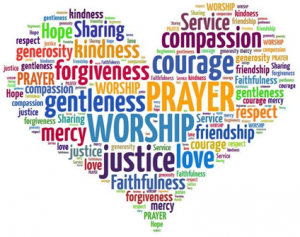RE
Canon Popham Collective Worship Policy
Canon Popham Spirituality Policy
Religious Education Statement of IntentReligious Education Curriculum Planning OverviewReligious Education Knowledge, Skills and Vocabulary ProgressionReligious Education End of phase outcomes
Religious Education is a legal entitlement for every pupil. Its place in our school curriculum acknowledges the important role which beliefs and values play in people’s lives and that religious beliefs and practices are as important in the lives of as many people worldwide today as they have been throughout history. RE offers pupils an opportunity to develop a better understanding of themselves, the people around them and the world in which they live.
We follow the Understanding Christianity and Discovery RE Syllabus which sets out the aims and programmes of study for RE. The Diocese provides us with additional guidance suited to the particular needs of a Church School and supports our overall aim to provide quality education within a caring and supportive Christian environment.
Pupils learn about and from Christianity in depth and also about and from other principle religions represented in Britain. RE provides our pupils with the opportunity to learn about other world faiths as they develop a sense of fairness and justice for all whatever their background or where they live. Our spiritual, moral, social and cultural education reinforces the children’s appreciation of others and their rights.
 What is Understanding Christianity?
What is Understanding Christianity?
Understanding Christianity is a Church of England Education Office project, which builds up pupils’ encounters with biblical concepts through texts, placing them within the wider Bible story. We use this resource to support some of our Christianity units; Christmas (Incarnation) and Easter (Salvation).
Through the teaching and learning approach it enables pupils to move from an understanding of the biblical text and how to handle it, to an understanding of what this means for Christians within the Church and in Christian living, including opportunities for pupils to examine and evaluate connections between these ideas and the wider world.
By addressing key questions, Understanding Christianity encourages pupils to explore core Bible texts, examine the impact for Christians and consider possible implications.
Each unit incorporates the three elements:
-
Making sense of the text– Developing skills of reading and interpretation; understanding how Christians interpret, handle and use biblical texts; making sense of the meanings of texts for Christians
-
Understanding the impact– Examining ways in which Christians respond to biblical texts and teachings, and how they put their beliefs into action in diverse ways within the Christian community and in the world
-
Making connections– Evaluating, reflecting on and connecting the texts and concepts studied, and discerning possible connections between these and pupils’ own lives and ways of understanding the world.
Understanding Christianity supports a spiral curriculum as Incarnation and Salvation are taught in every year group and the prior knowledge and skills are built upon.
 What is Discovery RE?
What is Discovery RE?
Discovery RE is an enquiry approach which supports the delivery of the statutory RE requirements and supports the Doncaster Locally Agreed Syllabus. We use this scheme to deliver the world faiths; Judaism Hinduism and Islam.
Each unit of work begins with a key question which demands an answer that weighs up ‘evidence’ and reaches a conclusion based on this. This necessitates children using their subject knowledge and applying it to the enquiry question, rather than this knowledge being an end to itself. Discovery RE focuses on critical thinking skills, on personal reflection into the child’ own thoughts and feelings, on growing subject knowledge and nurturing spiritual development. It also equips children to celebrate diversity.
Discovery RE has a 4 step enquiry approach:
-
Engagement – The human experience underpinning the key question is explored within the children’s own experience, whether that include religion or not. If they can relate to this human experience they will be better able to understand the word of religion into which he enquiry takes them.
-
Investigation – Children are guided through the enquiry, gaining subject knowledge to assist their thinking about the key question. The acquisition of the factual information about the religion/belief being studied is important but not as an end in itself.
-
Evaluation – Children draw together their learning and their conclusions about the key question of the enquiry.
-
Expression – Children are taken back to step 1, their own experience, to reflect on how the enquiry might have influenced their own starting points and beliefs.
Discovery RE supports a spiral curriculum as faiths are revisited in different year groups and the prior knowledge and skills are built upon.
Link to National Curriculum
Religious education in local-authority-maintained schools – GOV.UK (www.gov.uk)
Link to Understanding Christianity
www.understandingchristianity.org.uk
Link to Discovery RE
Discovery RE Scheme Of Work | Discovery RE (discoveryschemeofwork.com)

